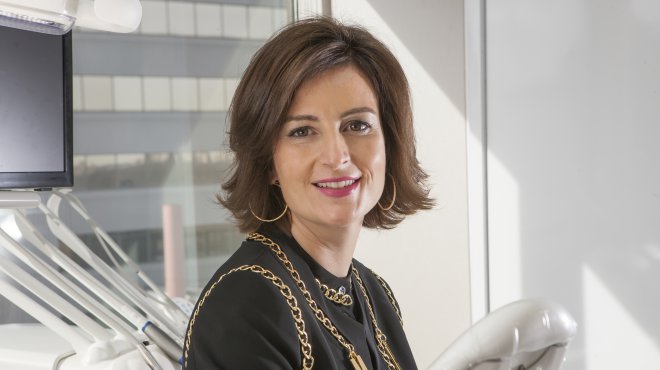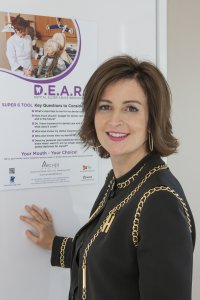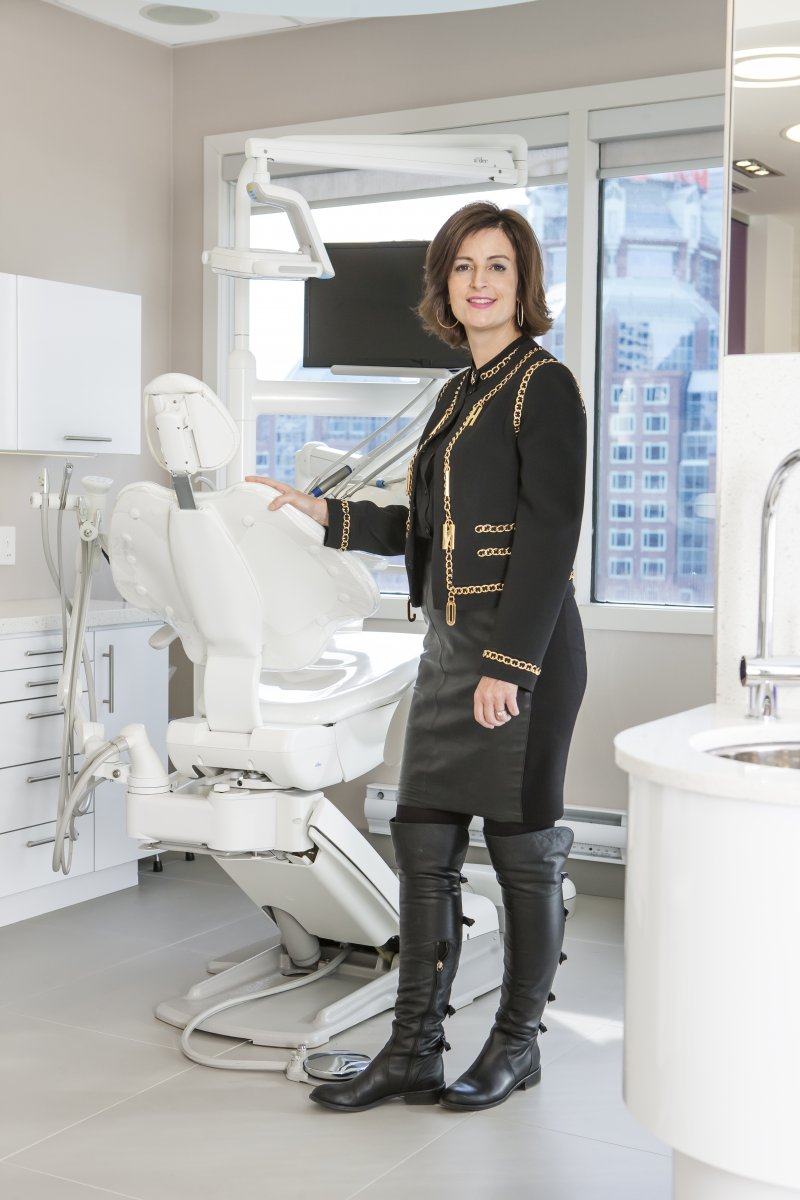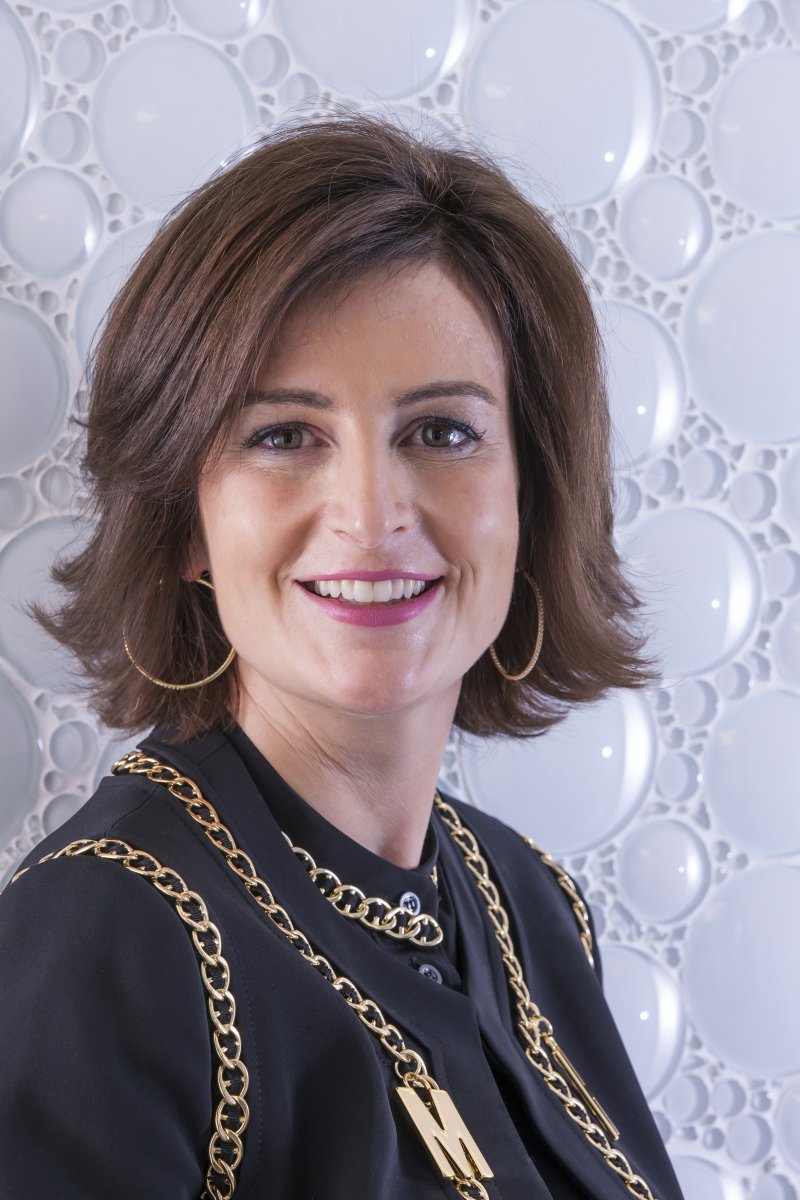
Dr. Natalie Archer (BSc’95, DDS’01): Dental advocate
By Mark Campbell
Dr. Natalie Archer wasn’t taking any chances. It was 1996, and the Keene, ON native (“People always joked that I was a keener,’ she observes. “I always said, ‘Literally, that’s true.’”) was concluding her second admission interview for Dalhousie’s dentistry program. Crushed that she had not made it in on her first try, she made a promise to the faculty: if accepted, she would go on to make a difference.
“At the time,” she concedes “I probably didn’t know what I meant. I had wanted to be a dentist for as long as I can remember. I really wanted to do well, and, for me, part of doing well was doing good in the world. So I said ‘If you let me in, I will not let you down.’”
Putting her promise into practice
She may not have known at the time how to make good on her promise, but Dr. Archer kept her word in a way that would make anyone associated with Dalhousie proud. Through her work at the Runnymede Dental Centre in Toronto, and the establishment of the innovative Dental Elder Abuse Response (D.E.A.R.) project, she has been a pioneer in raising awareness about the importance of providing dental care for older populations, specifically people in long-term care.
how to make good on her promise, but Dr. Archer kept her word in a way that would make anyone associated with Dalhousie proud. Through her work at the Runnymede Dental Centre in Toronto, and the establishment of the innovative Dental Elder Abuse Response (D.E.A.R.) project, she has been a pioneer in raising awareness about the importance of providing dental care for older populations, specifically people in long-term care.
“Of all the forms of elder abuse out there, dental elder abuse is the most common form,” says Dr. Archer. “That’s what we discovered in doing the research for D.E.A.R. Part of it is a lack of knowledge among seniors, institutions and family members about the importance of dental health, but there is also neglect and abuse.
“As dentists,” she continues, “we’re well versed in what can be defined as child abuse, but there hadn’t been much in the way of discussion and effort to address dental issues among older adults. There’s a huge growing segment of the population that does not have access to a private dentist. They are vulnerable, they are medically compromised, they are fragile, and they are important. We need to do everything we can to ensure they receive cleaning and treatment.”
Planting the roots of compassion
 That determination to serve patients who otherwise might be overlooked was fostered in part while studying at Dalhousie. Dr. Archer fondly recalls the clinics and school outreach programs that provided opportunities to work with more vulnerable communities and populations and says they were particularly influential.
That determination to serve patients who otherwise might be overlooked was fostered in part while studying at Dalhousie. Dr. Archer fondly recalls the clinics and school outreach programs that provided opportunities to work with more vulnerable communities and populations and says they were particularly influential.
“For example, children at the schools had decay and very much needed dental care. Visiting these schools made access to care a wonderful thing, but also important to me. Dalhousie provided insights and inspiration to do my own outreach work and innovative approaches to help the community, particularly our older adults.”
Dr. Archer’s interest in elder care began in earnest when she committed to a mobile dental care service shortly after relocating to Toronto in 2001. Each Friday, she visited retirement homes and long-term care facilities with an assistant, and she quickly became dispirited by the conditions she encountered.
“There were broken teeth, abscesses, pain and infections. We’re talking hundreds of patients in this situation, and I got very upset with what I saw. I decided to come up with a strategic plan to do something about it.”
An authority in elder dental care
As it happened, Runnymede Healthcare Centre had been looking at setting up a dental clinic that would focus on elder care. The president and CEO, Connie Dejak, approached Dr. Archer about running it. Starting with one Friday a month, Dr. Archer and an assistant initially focused on inpatients so they could build a trained team and determine the type of care required.
That was in 2011. “Today,” Dr. Archer notes, “we have referrals coming from across the Greater Toronto Area. We have a waitlist for new patient appointments. We have organizations like the Canadian Paraplegic Association and the Alzheimer’s Society referring patients. And now, with the experience we’ve built, I’m hoping we can teach other dentists, students and schools how to treat the fastest growing demographic in the city.”
notes, “we have referrals coming from across the Greater Toronto Area. We have a waitlist for new patient appointments. We have organizations like the Canadian Paraplegic Association and the Alzheimer’s Society referring patients. And now, with the experience we’ve built, I’m hoping we can teach other dentists, students and schools how to treat the fastest growing demographic in the city.”
Although the clinic has made great strides in addressing dental elder abuse, Dr. Archer realized that treatment alone was not enough. It was an issue of education, of awareness, and of policy. She partnered with the Canadian Centre for Elder Law and National Initiative for the Care of the Elderly to launch the D.E.A.R. project. Its objective is to link and equip dental professionals with the knowledge and resources – workshops, videos, brochures – to ‘take the bite out of elder abuse.’
“We try to put everything online, because that’s just the easiest, most cost-effective way to do it. We had facilitators, mostly seniors, going out to teach people. We did surveys, participated in health fairs, and visited long-term care facilities to get the word out about it, and we used the Runnymede clinic for research.”
A global impact
Given that no one had even remotely attempted an undertaking like this before, it quickly drew attention from around the world. Professionals and associations in Brazil, Africa, Cuba and the United States have all been in contact about using D.E.A.R.’s content or launching something similar. Dr. Archer says it’s rewarding to see interest in the project, but it does not quite compare to seeing the difference that D.E.A.R. and the Runnymede clinic have made in Toronto.
“Many older adults feel they are burdening family members. They don’t want to trouble them. So they may go years without seeing a dentist, which means there is embarrassment, not to mention awkwardness from family members. Once we take good care of them, once we show them what we can do for them, it changes their lives. The feedback we get about what we do, that’s been the best reward.
Always looking forward
Tending to two clinics, the D.E.A.R. project, her family and professional involvements, you might think Dr. Archer would be reluctant to take on more. But that promise to Dalhousie seems to keep motivating her. She’s in talks to help Syrian refugees with their dental needs, working with the Alzheimer’s Society on an awareness project, even contemplating how she can contribute to the Dalhousie Faculty of Dentistry Clinic Renewal initiative. And she’d like to change elder care policy related to dental care in Ontario.
seems to keep motivating her. She’s in talks to help Syrian refugees with their dental needs, working with the Alzheimer’s Society on an awareness project, even contemplating how she can contribute to the Dalhousie Faculty of Dentistry Clinic Renewal initiative. And she’d like to change elder care policy related to dental care in Ontario.
“The number-one cause of death in long-term facilities is acquired pneumonia. It’s a buildup of plaque in the mouth that is completely preventable. Whether it’s through policy, education or empowering people, everyone should know how to prevent it. If I can do that, it would make me happy.
“But what I’d really like,” she continues “is to show the profession that geriatric dentistry is the best, most rewarding, most wonderful practice to be in. Ultimately, we need to ensure that everyone has access to dental care because everyone deserves to live pain and infection free.”
To learn more about the Dental Elder Abuse Response (D.E.A.R.) project, please visit the project’s website.
Photos by Bill Petro